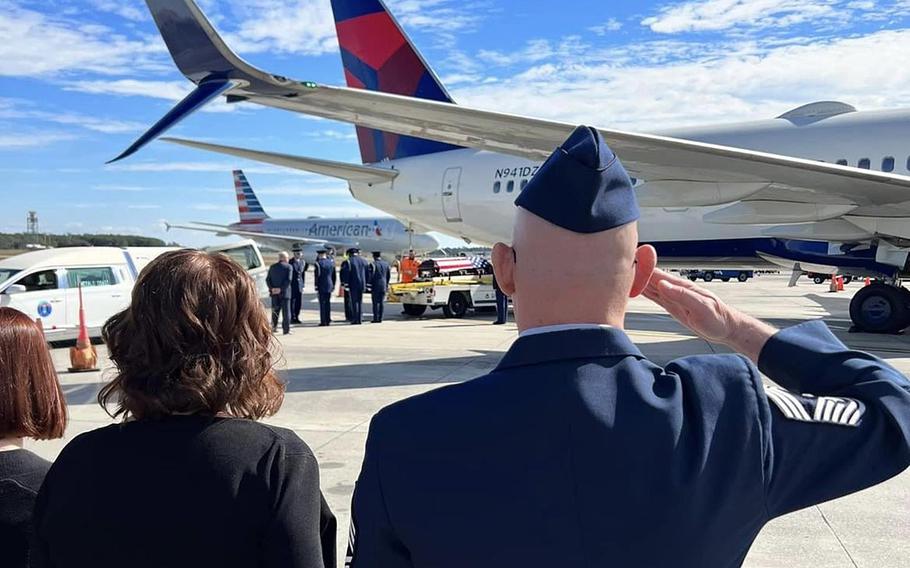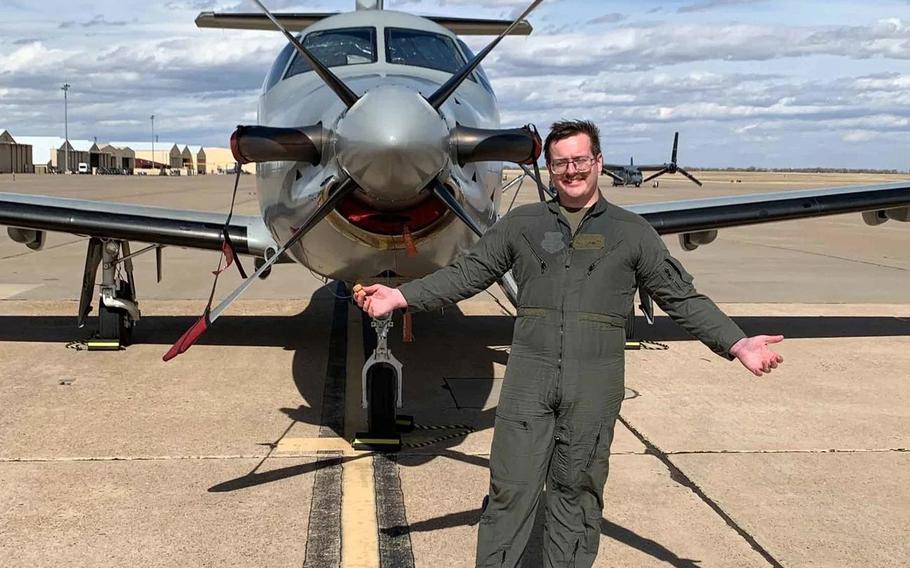
Sean T. Stevenson, a retired U.S. Air Force chief master sergeant, salutes as his son Sean “Ryan” Stevenson’s casket is unloaded from an airplane. The younger Stevenson took his own life Nov. 1, 2023, at Cannon Air Force Base, N.M. With Stevenson are his wife and daughter. (Sean T. Stevenson/Reddit)
The Air Force’s most senior leaders won’t be at the memorial service next week for a young airman who died by suicide, after a desperate plea from his father to have the service’s top brass in attendance.
“This invitation is for you to stand by the side of a grieving family” and show the strong leadership required to “eradicate the horrific epidemic of military suicide,” Sean T. Stevenson wrote Nov. 22 in an open letter to military leaders posted on Reddit’s Air Force page.
Senior Airman Sean “Ryan” Stevenson died Nov. 1, “broken and alone,” let down “by the very Air Force he dearly loved,” wrote the father, a retired Air Force chief master sergeant.
The letter was addressed to the Air Force’s top leadership, the chairman of the Joint Chiefs and the secretary of defense. The letter included his son’s last written words, in which he apologizes to his family.
The 24-year-old was qualified as an aviator at Cannon Air Force Base in New Mexico and was preparing to go to his next duty station in Japan when he ran into a series of logistical roadblocks that appeared to push him over the edge.
His unit, the 43rd Intelligence Squadron, is hosting a memorial ceremony Thursday, and two colonels will attend on behalf of Air Force leadership, the service said Wednesday.
The attendees will include Col. Jeremy Bergin, the 27th Operations Wing commander, and Col. John Thorne, the commander of the 363rd Intelligence, Surveillance and Reconnaissance Wing, both of whom were part of Stevenson’s chain of command.

Senior Airman Sean “Ryan” Stevenson poses in front of an airplane in this undated photo. Stevenson died by suicide Nov. 1, 2023, at Cannon Air Force Base, N.M., his father said in an open letter to Pentagon officials posted on Reddit. (Sean T. Stevenson)
The elder Stevenson remains optimistic that top Pentagon officials will show up at the memorial and “take a visible stand to end this scourge,” he said Thursday to Stars and Stripes.
If they don’t, the words of service members commenting on his post “will continue to be the voice and face of the suicide crisis our military finds itself in.”
On Reddit, Stevenson’s letter received over 1,300 interactions and hundreds of comments. His son’s final words were found on his computer by officials investigating his death, Stevenson said.
The airman was a tactical systems operator with more than 800 combat flying hours over Afghanistan and Somalia, according to his obituary. The note found on his computer described his despair as his life began to unravel.
He wrote about his desperation to get out of Cannon after more than five years at the base, which is considered by some airmen to be one of the Air Force’s least desirable locations.
Despite numerous attempts, his medical clearance was scheduled only two weeks before his transfer, and he didn’t complete checkout before his scheduled departure.
He went to the airport anyway without telling his unit, afraid of missing his flight. When he was ordered to come back, he said, “my heart dropped, I couldn’t think, and my hands were shaking.”
In closing, he told his parents, “I loved the Air Force since I was a kid, but over the last year, I have learned just how little the Air Force cares about me.”
One Reddit commenter said he “so much” related to the airman’s words after having been stationed at Cannon himself.
“I felt the frustration and I screamed internally because I saw my own troops go through that same hell” when they prepared for a move, the comment said.
Another person was struck by the airman’s seeming lack of comfort to talk with his leadership.
“I notice this is a pretty common theme in the military, especially with younger members who fear possible negative repercussions,” the person wrote.
Stevenson’s death is under investigation, the Air Force said in a statement Wednesday.
“We are committed to fostering a culture that encourages help-seeking behavior and dispels the perceived stigma of seeking mental health treatment,” the statement said.
The Air Force did not provide its most recent suicide statistics following a written request, saying they are provided quarterly to the Pentagon.
The Pentagon’s latest report shows data from April 1 to June 30. The Air Force’s active component had 20 known or suspected suicides, up five from the same period in 2022, and 34 during the first six months of the year, according to the report.
The latest annual suicide report for the U.S. military, released last month, shows 492 suicide deaths among active duty, National Guard and reserve personnel in 2022, down from 524 in 2021. The totals for active-duty personnel rose from 328 in 2021 to 331 last year, according to the report.
The active-duty Air Force had 63 suicide deaths in 2022, 12 more than in 2021, according to the report.